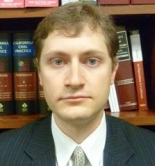Industry Insights
February 25, 2020
Grinberg: State Supreme Court Rules on 'Bag Check' Time at Work
- State: California
- - 0 shares
Have you ever mentioned to someone that you are in the world of workers’ compensation, only to be peppered by employment law questions? Well, get ready for a little bit of that.

Gregory Grinberg
The California Supreme Court issued an opinion this month in the case of Frlekin v. Apple Inc. Therein, the Supreme Court held that “time spent on the employer’s premises waiting for, and undergoing, required exit searches of packages, bags, or personal technology devices voluntarily brought to work purely for personal convenience by employees [is] compensable as ‘hours worked.'”
If this sounds familiar, perhaps you recall this earlier blog post.
So what’s the setup? Apple requires employees to go through security checks on their way out, whether at the end of their shifts or if they are just going out for break. This allows Apple to make sure none of its dedicated employees have had products normally for sale “accidentally” fall into their bags. This is a method of preventing “shrinkage,” loss or employee theft (however one might call it).
But, understandably, the budget for security in this sense is limited, so employees often find themselves waiting for extended periods of time just to pass through the security and leave. Well, the issue at hand is whether that time spent going through security is “work” or “not work.”
The Supreme Court decided that it is work. So, time spent in security checkpoints is compensable for wages, affects average weekly wages, and any injuries sustained while going through security would likely be compensable as well.
So what does that mean for us? What are we, the brave denizens of workers’ compensation, to make of this ruling from the Supreme Court? Well, there’s nothing good in this, that’s for sure.
In my estimation, at least, this opens the door for a wide spectrum of activities undertaken to comply with an employer’s procedures. Workers’ can make the argument that time spent in compliance with basic procedures that would logically fall under the “going and coming” rule and exclude compensability are now part of the workday.
We’ll see, of course, how this ultimately plays out, but perhaps we can look forward to colorful theories being advanced about why the employer putting a name tag on at home before leaving for work is part of the workday, or why the injured worker’s commute-related injury is industrial because he was thinking about work when he T-boned a third party.
At least we won’t be bored, right?
Gregory Grinberg is a workers' compensation defense attorney at the Law Office of Gregory Grinberg, based in the San Francisco Bay Area. This post is reprinted with permission from Grinberg's WCDefenseCA blog.
Advertisements
Columns
- CAAA: New Comp Laws Take Effect in 2026 12/31/25
- Opalisky: The Ongoing War Over State's Statutory Employer Doctrine 12/30/25
- Kamin: Our Top 10 Blogs of 2025 12/26/25
- Barthel: Are You an Employer, or Do You Use Independent Contractors? Can You Prove It? 12/24/25
- Barthel: Is Pot a Defense? Are You High? 12/22/25
- Barthel: Is Dubon II on the Way Out? 12/17/25
- Montgomery: San Fran City Official Stole $627k From Workers' Comp Division 12/10/25
- Kamin: Ring the Bells for Settlement Season 12/08/25
- Paduda: Does Comp Care About Workers? 12/05/25
- Sandoval: Throwing Subrogation Under the Bus 12/03/25
- Johnson: Some Thoughts on Apportionment - And SIBTF 11/20/25
- Montgomery: State's First Responders May File Comp Claims for Trauma 11/14/25
- Snyder: Use This New Survey to Negotiate Better 11/12/25
- Holden: Workers' Compensation Act Withstands Another Constitutional Attack 11/11/25
- Gelman: Sherrill's Win Locks in Worker Protections 11/10/25
- Kamin: Newsom Promises SIBTF Reforms in 2026 11/07/25
- Kamin: Comp Costs Hit Highest Combined Ratio Since 2001, WCIRB Says 11/05/25
- Montgomery: DIR to Blow $1.25M on Another Questionable Comp Study 11/03/25
- Wroten: California Sets the Standard as New Study Links Workplace Injuries to Heat Exposure 10/29/25
- Kamin: En Banc Clarifies Policy Reporting Requirements 10/27/25
Now Trending
- Workers' Compensation News
-
Tenn. High Court
Defines Aggravation of Preexisting
Condition Under 2013…
Posted on Dec 24, 2025
-
Calif. DWC Updates
Medical Equipment Section of Fee…
Posted on Dec 29, 2025
-
Texas Court:
Refinery Owner Entitled to Mandamus
Relief Dismissing Worker's Claims…
Posted on Dec 29, 2025
-
Tenn. High Court
Creates Employment Test for Vendor…
Posted on Dec 26, 2025
-
Ohio Injured
Worker Establishes Entitlement to
Expand Scope of Claim…
Posted on Dec 30, 2025
-
Texas Audit
Identifies Opportunities to Improve
Prescribing…
Posted on Dec 24, 2025
-
La. Res Judicata
Doesn't Bar Worker's Claim Against…
Posted on Dec 30, 2025
-
La. Supreme Court
Finds Employer's Payment of
Benefits Tacitly Renounced…
Posted on Dec 29, 2025
-
Wash. Bills Would
Lower Settlement Age, Require More
Information for Rate…
Posted on Dec 26, 2025
-
Ore. WCD Updates
Lump-Sum Payment…
Posted on Dec 24, 2025
Jobs
- Defense Attorneys - Remote Work Available
- Trial Attorney - Workers Compensation Staff Counsel
- Defense WC Attorney Wanted- We will beat any offer for the right candidate. Low billables, real bonuses and fast track equity partnership
- Workers' Compensation Examiner
- JC-501284 Workers’ Compensation Judge
- Legal Secretary
- Attorney for Northern California Workers' Compensation Jobs
Upcoming Events
Jan 15, 2026
Webinar: Psychosocial Factors
Discover how psychosocial factors impact recovery outcomes in injured workers during WCRI’s 30-min …
Jan 22, 2026
Outlook 2026: What’s Ahead for
WorkCompCentral is hosting a 120-minute, CA MCLE–accredited live webinar on January 22, 2026 (time …
Mar 3-4, 2026
Save The Date! WCRI’s 2026 Ann
Registration will open up in the coming months. We'll see you there! - Leading national workers' …
Social Media Links
c/o Business Insurance Holdings, Inc.
Greenwich, CT 06836




No Comments
Log in to post a comment